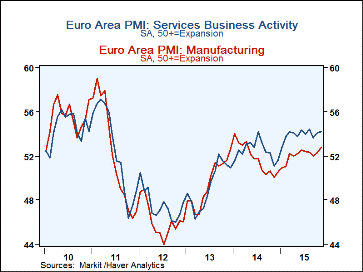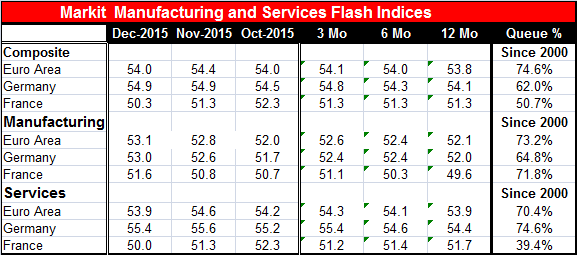 Global| Dec 16 2015
Global| Dec 16 2015EMU Flash Total PMI Slips in December- Little to Cheer
Summary
The chart shows the long flat performance of the EMU-wide services metric while manufacturing shows only a recent tendency to tick higher. The EMU has a composite PMI measure that is even with its six-month average but below its [...]
 The chart shows the long flat performance of the EMU-wide services metric while manufacturing shows only a recent tendency to tick higher. The EMU has a composite PMI measure that is even with its six-month average but below its three-month average. Germany's composite PMI is above its various averages in December. France is below all its sequential averages in December.
The chart shows the long flat performance of the EMU-wide services metric while manufacturing shows only a recent tendency to tick higher. The EMU has a composite PMI measure that is even with its six-month average but below its three-month average. Germany's composite PMI is above its various averages in December. France is below all its sequential averages in December.
Manufacturing in December rose in each of the bellwether countries. It as a result of this rise that the manufacturing PMIs are higher than their three-month, six-month and 12-month averages for the EMU as a whole as well as for Germany, and France separately.
Conversely, the services sector saw downshifts across the EMU and in its two largest economies in December. The EMU services sector index is below its three-month and six-month averages and it is even with its 12-month average. The services sector has moderated in December. For France the services reading in December is lower than each of its sequential averages. Germany's services reading in December is even with its three-month average but higher than its six-month and 12-month averages.
France continues to show the lowest PMI readings for manufacturing and for services in December; lower than in Germany, and lower than the EMU-wide average. However, in relative terms, France is doing better as its manufacturing sector percentile standing is above that of Germany and just behind the standing for the EMU as a whole. However, the French services sector, at a 50.0 diffusion reading, sports a standing in its 39th percentile- a very weak position.
Germany has the highest raw diffusion reading for services and is just a tick behind the manufacturing sector for the EMU. But Germany's queue percentile standing overall is in its 62nd percentile; it is at its 64th percentile for manufacturing and in the 74th percentile in services. Despite its relatively strong PMIs in comparisons with the EMU and France Germany is still relatively weak compared to its own history.
Wrap up
The end-of-year PMI readings are not particularly encouraging. France is ending the year on a weakening in services and a minor bump in manufacturing that is hard to take too seriously given the weakness in that sector globally. And while France's manufacturing PMI is higher than its sequential averages, this is still a relatively modest raw diffusion standing that has not yet proved it can stand the test of time. In contrast, Germany shows some momentum with its sequential moving averages ticking higher, but at a very slow speed. The EMU as a whole shows that same characteristic for its sequential averages.
So December was not a particularly good one for the EMU, Germany or for France. Momentum is hardly much of a positive. The best news for the EMU is that the ECB did implement a program of greater stimulus, but as we can see, it did not launch that program into an accelerating economy. The EMU, it would seem, ends 2015 on a still struggling note and any optimism we have for 2016 is mostly on the back of things we have yet to see but hold hopes for.

Robert Brusca
AuthorMore in Author Profile »Robert A. Brusca is Chief Economist of Fact and Opinion Economics, a consulting firm he founded in Manhattan. He has been an economist on Wall Street for over 25 years. He has visited central banking and large institutional clients in over 30 countries in his career as an economist. Mr. Brusca was a Divisional Research Chief at the Federal Reserve Bank of NY (Chief of the International Financial markets Division), a Fed Watcher at Irving Trust and Chief Economist at Nikko Securities International. He is widely quoted and appears in various media. Mr. Brusca holds an MA and Ph.D. in economics from Michigan State University and a BA in Economics from the University of Michigan. His research pursues his strong interests in non aligned policy economics as well as international economics. FAO Economics’ research targets investors to assist them in making better investment decisions in stocks, bonds and in a variety of international assets. The company does not manage money and has no conflicts in giving economic advice.
More Economy in Brief
 Global| Feb 05 2026
Global| Feb 05 2026Charts of the Week: Balanced Policy, Resilient Data and AI Narratives
by:Andrew Cates






